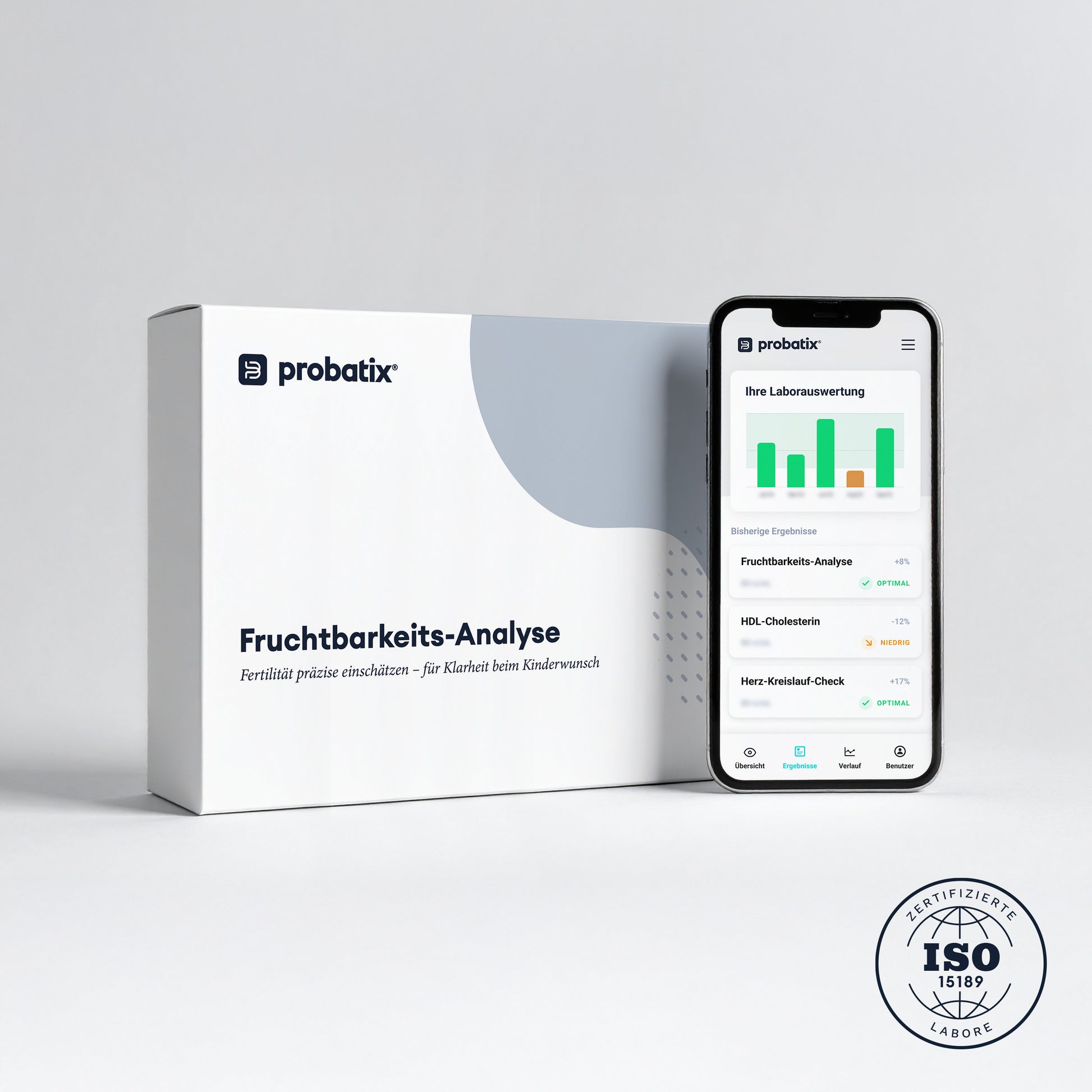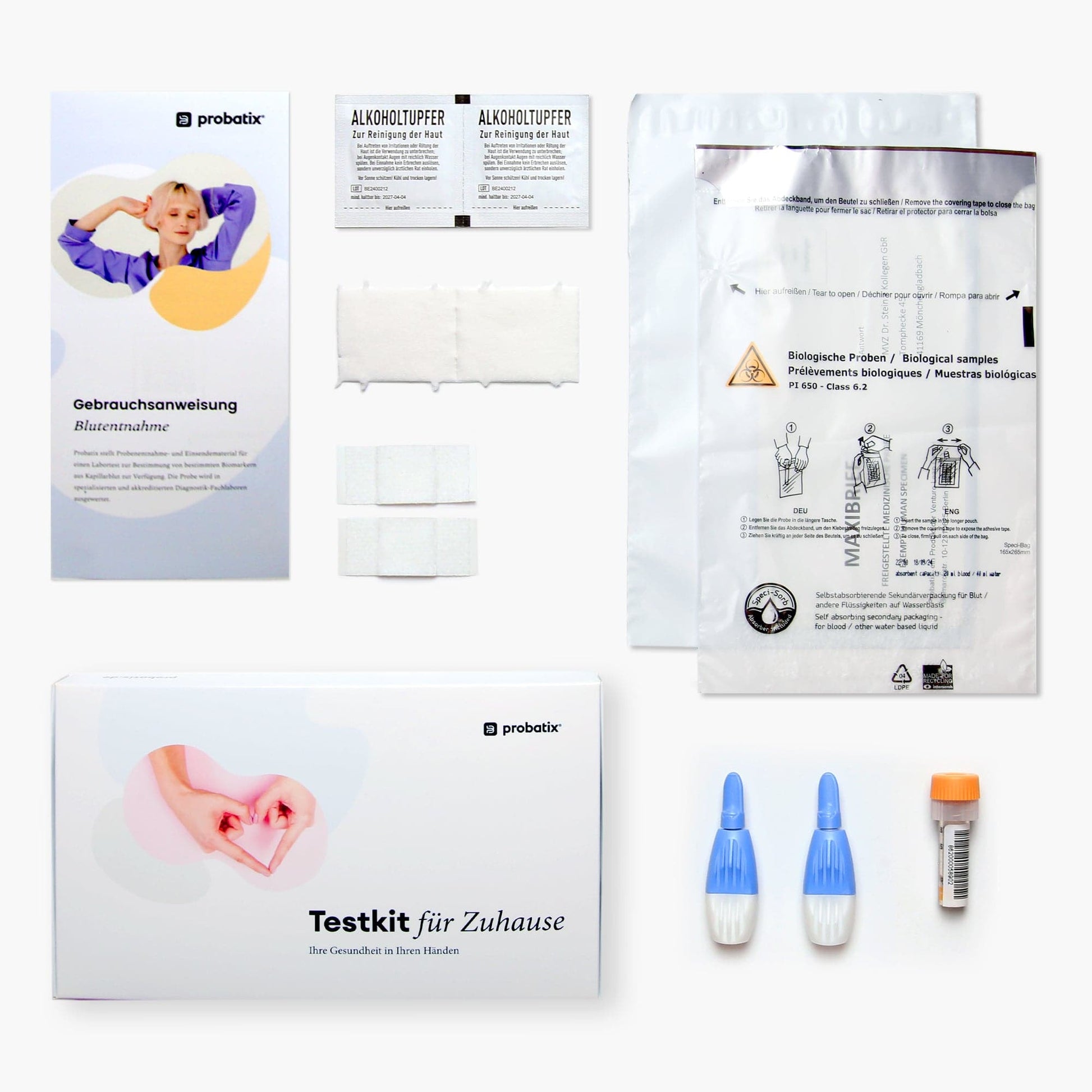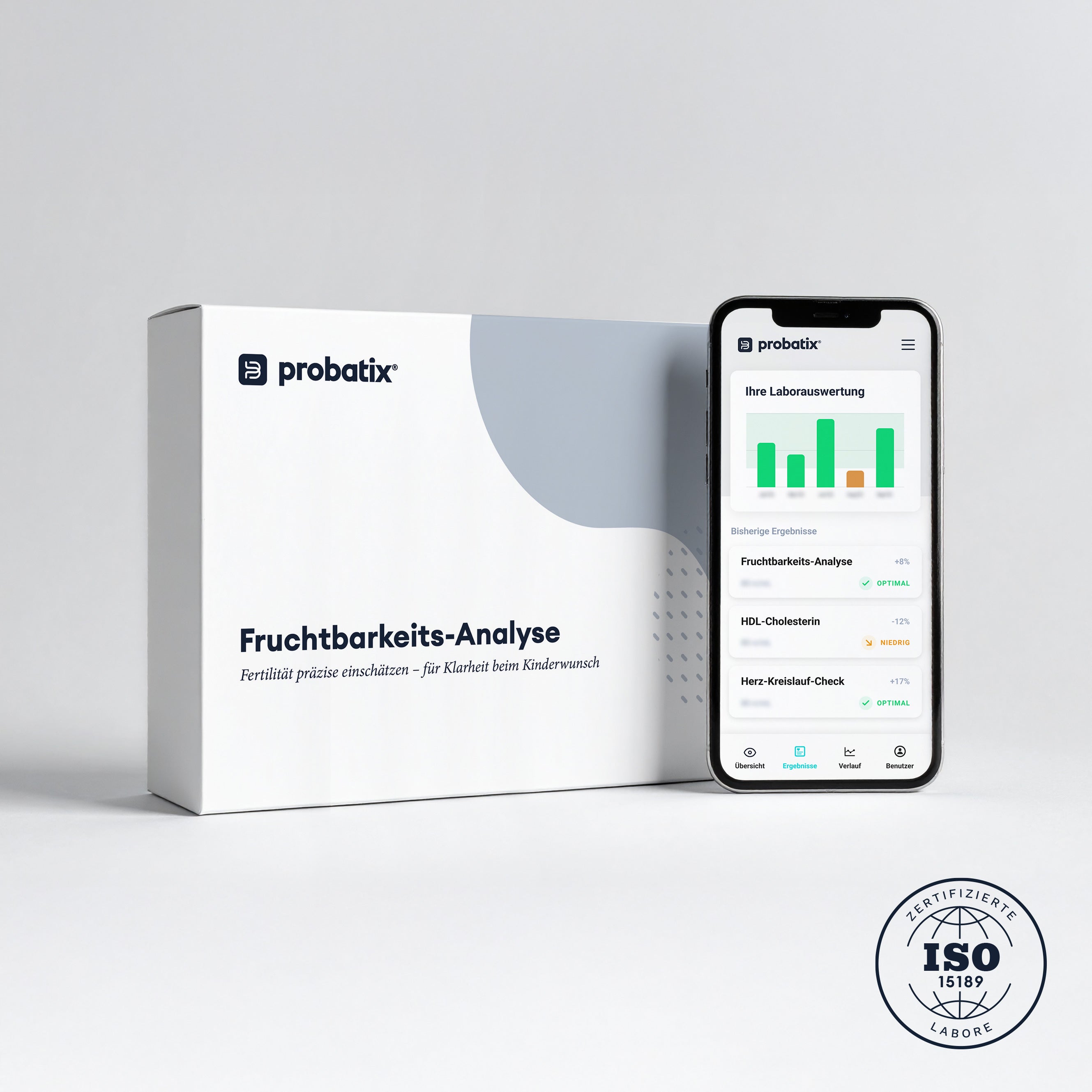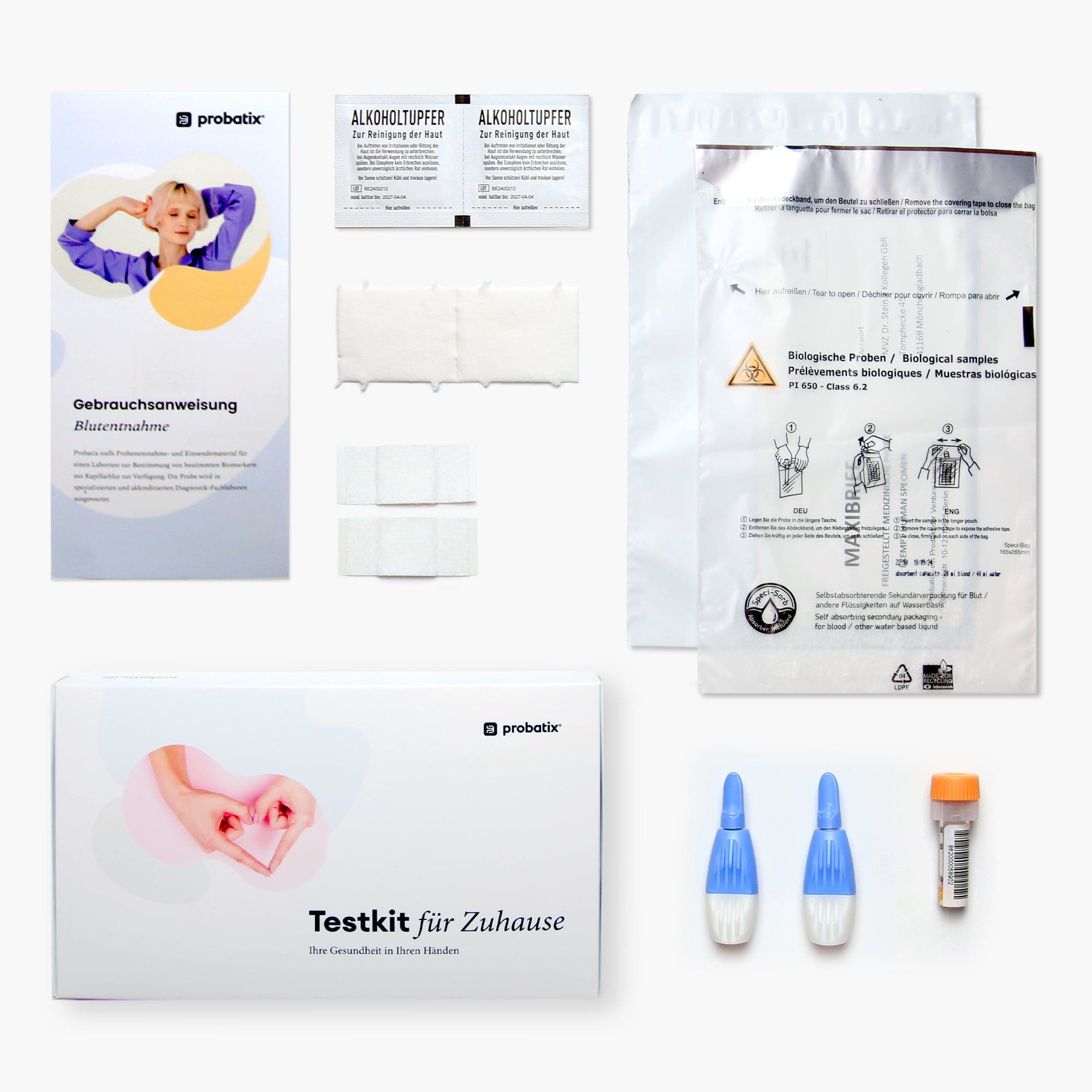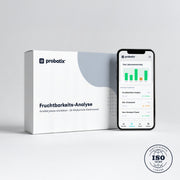Fertility Analysis
Fertility Analysis
A fertility test is an essential step to better understand your reproductive health and make informed decisions for your family planning.
With the Fertility Analysis for Women from
- Hormonal Analysis: Examination of AMH (Anti-Müllerian Hormone), Estradiol (E2), FSH (Follicle Stimulating Hormone), total Progesterone, and Prolactin for a holistic assessment of your fertility.
- Simple && discreet: Sample collection conveniently at home with professional lab evaluation.
- Clear Feedback: Your values are clearly presented and compared to reference ranges.
Take the opportunity to understand your fertility early and make informed decisions.
Tip: Get a more comprehensive picture of your female hormones with our Women's Hormone Profile.
In stock
What values does this test measure?
What values does this test measure?
Further information on the values can be found here.
How does it work?
How does it work?
1. Take a sample with our test kit
2. Send the sample to the lab with the prepaid envelope
3. View results digitally after a few days
Why are the values reliable?
Why are the values reliable?
All tests offered by us are evaluated and validated in certified medical laboratories in Germany.
This is what the press says about our tests
Fertility Analysis: All details about the test
What benefits does this test offer me?
What benefits does this test offer me?
Fill in the text content of the collapsible item here. You can provide details and explanation for the question here.
Your family planning begins with clarity – learn more about your fertility.
The at-home fertility test for women offers you a detailed analysis of your hormonal levels, including Anti-Müllerian Hormone (AMH), Follicle Stimulating Hormone (FSH), and Estradiol. These values provide you with valuable insights into your fertility and support you in making informed decisions for your family planning.
Your benefits of the fertility test at a glance:
- Comprehensive results: The analysis of the key hormones for fertility is conducted in certified laboratories.
- Simple and discreet: Sample collection is done conveniently and calmly from home.
- Time-saving: No long waiting times in the doctor's office. Results are available in a few days.
- Clear feedback: Your individual report is available online and shows you your values compared to the reference ranges.
Take the first step for your family planning – with the fertility test from
Attention: This is a fertility test for womenwho want to check their fertility. For accurate measurement, specifying the cycle day is crucial. This test is not suitable for men.
What do the measured values mean?
What do the measured values mean?
Fill in the text content of the collapsible item here. You can provide details and explanation for the question here.
Estradiol (E2) is the most important estrogen in the body and plays a central role in fertility and the female cycle. It is predominantly produced in the ovaries, and in smaller amounts in the testes and adrenal glands in men. Estradiol also influences bone metabolism, the skin, and the cardiovascular system.
High estradiol levels can be found, for example, during ovulation, pregnancy, or hormone therapies. Low levels occur during menopause and can be associated with symptoms such as hot flashes, sleep disturbances, or bone loss.
Anti-Müllerian Hormone (AMH)
The anti-Müllerian hormone (AMH) is produced in the testes in men and in the ovaries in women. In male embryos, it ensures that the Müllerian ducts regress, while female embryos have only very low AMH levels, allowing the uterus and fallopian tubes to develop.
In women of reproductive age, the AMH level serves as a measure of the so-called ovarian reserve – a high value means that many eggs are still present; with increasing age, the level decreases and falls to zero with menopause. AMH measurements are primarily used in fertility treatments to estimate the number of available eggs and to plan hormone dosing. The test is also used to detect a premature transition to menopause and to diagnose polycystic ovary syndrome or certain ovarian tumors.
Follicle Stimulating Hormone (FSH)
FSH (Follicle Stimulating Hormone) is produced in the pituitary gland and plays a central role in fertility. In women, it stimulates the maturation of follicles in the ovaries, while in men, it supports the production of sperm in the testes.
Elevated FSH levels may indicate that the ovaries or testes are no longer functioning adequately, as is the case during menopause, for example. Low levels are more indicative of a disorder in the pituitary gland or the overarching hormonal system.
Prolactin
Prolactin is a hormone produced in the pituitary gland. It plays a crucial role in the development of the mammary glands and in milk production after birth. Even outside of pregnancy and breastfeeding, prolactin can be detected in the blood.
Elevated prolactin levels can lead to menstrual cycle disorders, infertility, or milk flow without pregnancy. In men, elevated levels often manifest as potency disorders or reduced sexual drive. Low levels are rare and usually of little significance.
Progesterone
Progesterone is a central hormone of the female cycle. It is produced after ovulation in the corpus luteum of the ovaries and ensures that the uterine lining is prepared for a possible pregnancy. If fertilization occurs, the progesterone level remains high and is later maintained by the placenta.
If progesterone is lacking or the level is too low, it can lead to cycle disorders, difficulties in the implantation of an egg, or early miscarriages. Elevated levels occur naturally during pregnancy but can also arise outside of it due to hormonal disorders, cysts, or rarely, tumors.
Why is this test important?
Why is this test important?
Fill in the text content of the collapsible item here. You can provide details and explanation for the question here.
A fertility test for women is important to assess reproductive women's health and to identify potential fertility issues early. This can help with family planning, determining the optimal time for conception, and diagnosing hormonal disorders such as PCOS.
When should I take this test?
When should I take this test?
Fill in the text content of the collapsible item here. You can provide details and explanation for the question here.
A fertility test can be useful in the following situations:
- When experiencing difficulties in becoming pregnant
- Before starting fertility treatment
- In case of irregular menstrual cycles
- If there is a suspicion of hormonal disorders
- For a general assessment of fertility
Consult a doctor or reproductive specialist to discuss the results and create an individual plan.
What is included in the test kit?
What is included in the test kit?
Where can I find the instructions?
Where can I find the instructions?
Fill in the text content of the collapsible item here. You can provide details and explanation for the question here.
Die Anleitung für diesen Labortest finden Sie auf Instructions: Capillary Blood Tests.Bei Fragen hilft Ihnen auch immer gerne unser wunderbarer Support weiter: support@probatix.de
FAQ - More Frequently Asked Questions about the Test
FAQ - More Frequently Asked Questions about the Test
Fill in the text content of the collapsible item here. You can provide details and explanation for the question here.
1. What is tested in a fertility test for women?
The fertility check measures hormonal markers such as Anti-Müllerian Hormone (AMH), Estradiol, and Follicle Stimulating Hormone (FSH), which provide important information about the egg reserve and hormonal health.
2. Who is the at-home fertility test suitable for?
The test is suitable for women who want to learn more about their fertility, whether for family planning, investigating an unfulfilled desire to have children, or checking hormonal status.
3. How does the test work?
The test is conducted through a simple blood sample that you can conveniently take at home. The sample is then sent to our laboratory for analysis.
4. When should I take the at-home fertility test as a woman?
The ideal time for the test is on the 2nd to 5th.Day of the menstrual cycle, as hormone levels are most meaningful during this phase.
5. How long does it take to receive my results?
The test results are usually available within a few days and can be viewed on your personal
6. What do the results indicate?
The test results show whether your hormone levels are within the normal range and provide insights into your fertility. If there are deviations, you will receive recommendations for possible further steps or medical consultation.
7. Can the test be conducted without the desire to have children?
Yes, the fertility check offers valuable insights into your hormonal health, even if you currently do not wish to have children.
8. How does the AMH value help in determining fertility?
The Anti-Müllerian Hormone (AMH) provides information about a woman's egg reserve.A low AMH level indicates a lower egg reserve, while a higher level suggests better fertility.
9. How does age affect fertility?
As age increases, fertility decreases because the number and quality of eggs decline. The fertility check can help determine the current status of the egg reserve.
10. Can the fertility check assist in preparing for fertility treatment?
Yes, the fertility check is often conducted before fertility treatment to assess the chances of success and to tailor the treatment plan individually.
Das sagen unsere Kunden
